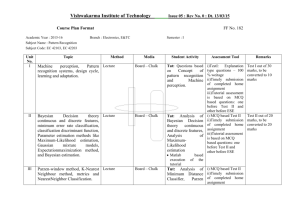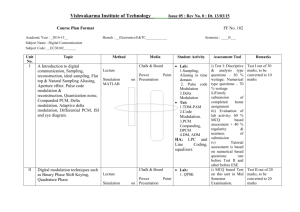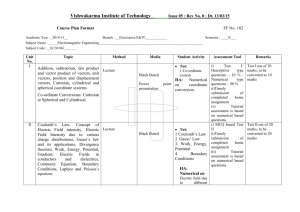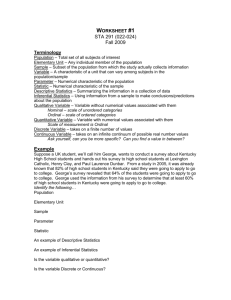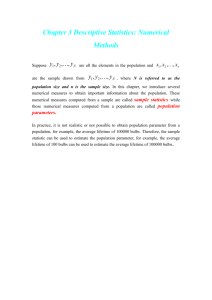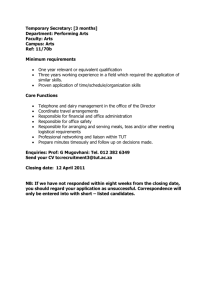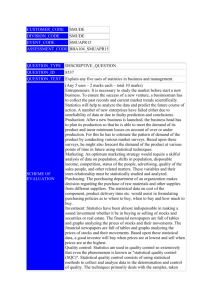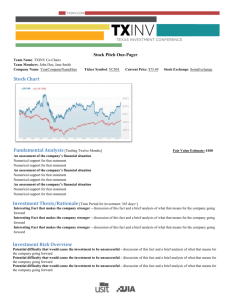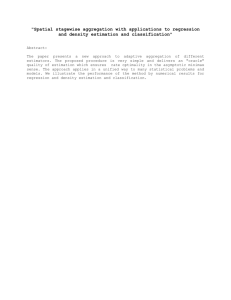FF 182_Speech & Video Processing
advertisement
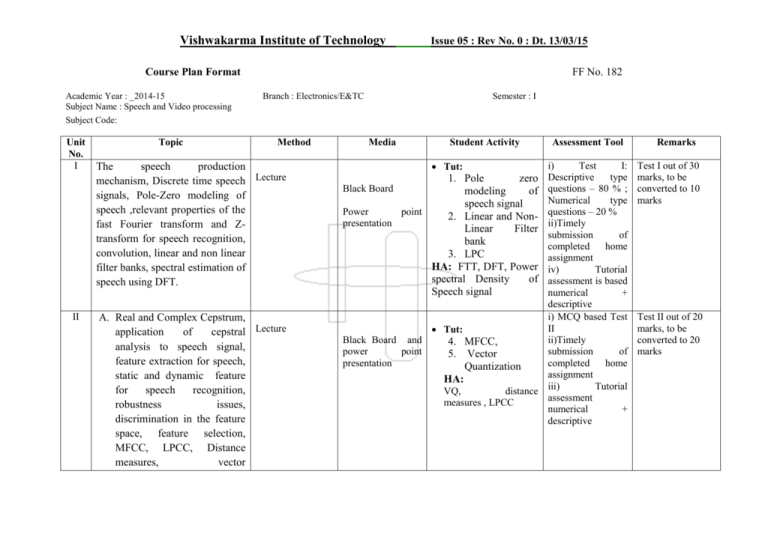
Vishwakarma Institute of Technology Issue 05 : Rev No. 0 : Dt. 13/03/15 Course Plan Format Academic Year : _2014-15 Subject Name : Speech and Video processing Subject Code: Unit No. I II Topic FF No. 182 Branch : Electronics/E&TC Method The speech production mechanism, Discrete time speech Lecture signals, Pole-Zero modeling of speech ,relevant properties of the fast Fourier transform and Ztransform for speech recognition, convolution, linear and non linear filter banks, spectral estimation of speech using DFT. A. Real and Complex Cepstrum, application of cepstral Lecture analysis to speech signal, feature extraction for speech, static and dynamic feature for speech recognition, robustness issues, discrimination in the feature space, feature selection, MFCC, LPCC, Distance measures, vector Semester : I Media Student Activity Tut: Assessment Tool i) Test I: Descriptive type questions – 80 % ; Numerical type questions – 20 % ii)Timely submission of completed home assignment iv) Tutorial assessment is based numerical + descriptive i) MCQ based Test II Tut: Black Board and ii)Timely 4. MFCC, power point submission of 5. Vector presentation completed home Quantization assignment HA: Tutorial VQ, distance iii) assessment measures , LPCC numerical + descriptive 1. Pole zero Black Board modeling of speech signal Power point 2. Linear and Nonpresentation Linear Filter bank 3. LPC HA: FTT, DFT, Power spectral Density of Speech signal Remarks Test I out of 30 marks, to be converted to 10 marks Test II out of 20 marks, to be converted to 20 marks Vishwakarma Institute of Technology Issue 05 : Rev No. 0 : Dt. 13/03/15 quantization models. III IV V Video formation, perception and Lecture representation: Principle of color video, video cameras, video display, pinhole model, CAHV model, Camera motion, Shape model, motion model, Scene model, two dimensional motion models Optical flow, motion representation, motion Lecture estimation criteria, optimization methods, pixel based motion estimation, Block matching algorithm, gradient Based, Intensity matching, feature matching, frequency domain motion estimation, Depth from motion. 2D and 3D video tracking, blob tracking, kernel based counter Lecture tracking, feature matching, filtering Mosaicing, video Tut: Black Board And Power point Presentation i) MCQ bsed Test HA: Camera Model , II ii)Timely motion model submission of completed home assignment iii) Tutorial assessment is based on numerical + descriptive i) End Semester Examination: Black Board Descriptive Power point questions – 75 % presentation Numerical type questions – 25 % ii)Timely submission of completed home HA: Block Based estimation, Depth from assignment iii) Tutorial motion assessment is based on numerical based questions. Tut: 1. Motion estimation 2. Frequency domain motion estimation Tut: Black Board Power Point Presentaion i) End Semester Examination: 1 Kernel based Descriptive tracking questions – 75 % type 2. video short Numerical Vishwakarma Institute of Technology segmentation, mean shift based, active shape model, video short boundary detection. Issue 05 : Rev No. 0 : Dt. 13/03/15 questions – 25 % ii)Timely submission of HA: Motion completed home assignment Compensation, iii) Tutorial assessment is based on numerical + descriptive boundary detection Levels of Bloom’s Taxonomy applicable for the course – Knowledge / Comprehension / Application / Analysis / Synthesis / Evaluation (Strike out levels not applicable) List of Reference Books and Text Books - Text Books: 1. Digital Video processing, A Murat Tekalp, Prentice Hall. 2. Fundamentals of Speech recognition – L. Rabiner and B. Juang, prentice Hall signal processing series 3. Discrete-time speech signal processing: principles and practice, Thmas F. Quatieri, Coth. Name and Signature of Faculty executing the course plan 1) Sidharth B. Bhorge signature of Chairman – BOS Date : 27/07/2015
